BBC Organisational Behaviour: Culture, Power and Motivation
VerifiedAdded on 2024/07/01
|33
|5728
|234
Report
AI Summary
This report provides a detailed analysis of organisational behaviour within the British Broadcasting Corporation (BBC), examining the influence of culture, politics, and power on employee behaviour. It explores various theoretical frameworks, including Charles Handy's cultural theory, Hofstede's dimensions of culture, and French and Raven's power theory, to understand their impact on individual and team performance. The report also evaluates content and process theories of motivation, such as Maslow's hierarchy of needs and Alderfer's ERG theory, to identify strategies for improving team effectiveness within BBC. Furthermore, it discusses team dynamics, group development theories, and the application of organisational behaviour concepts to address barriers to effective performance, using the path-goal theory to inform and influence employee behaviour positively. The analysis aims to provide insights into enhancing organisational culture, motivation, and team collaboration within the BBC.
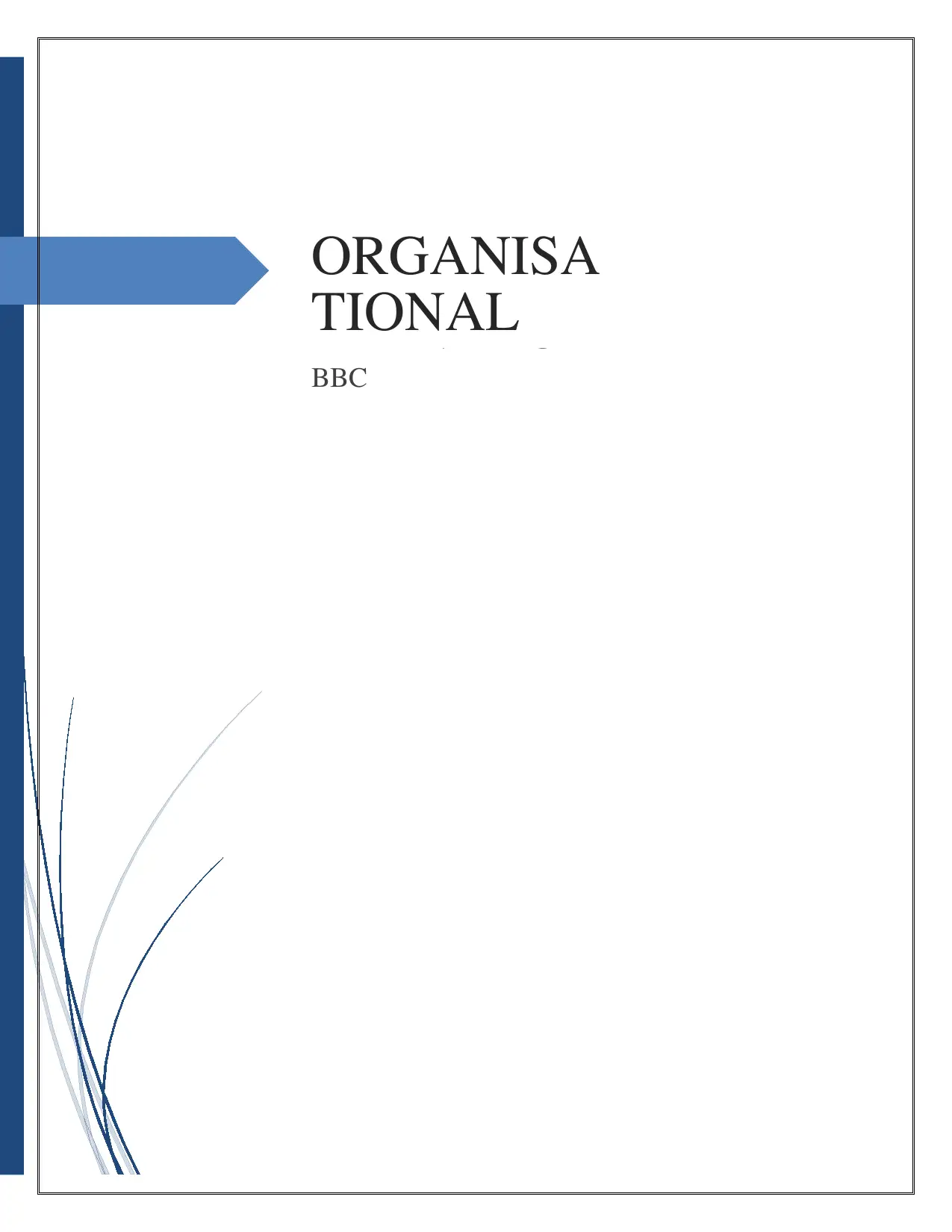
Paraphrase This Document
Need a fresh take? Get an instant paraphrase of this document with our AI Paraphraser
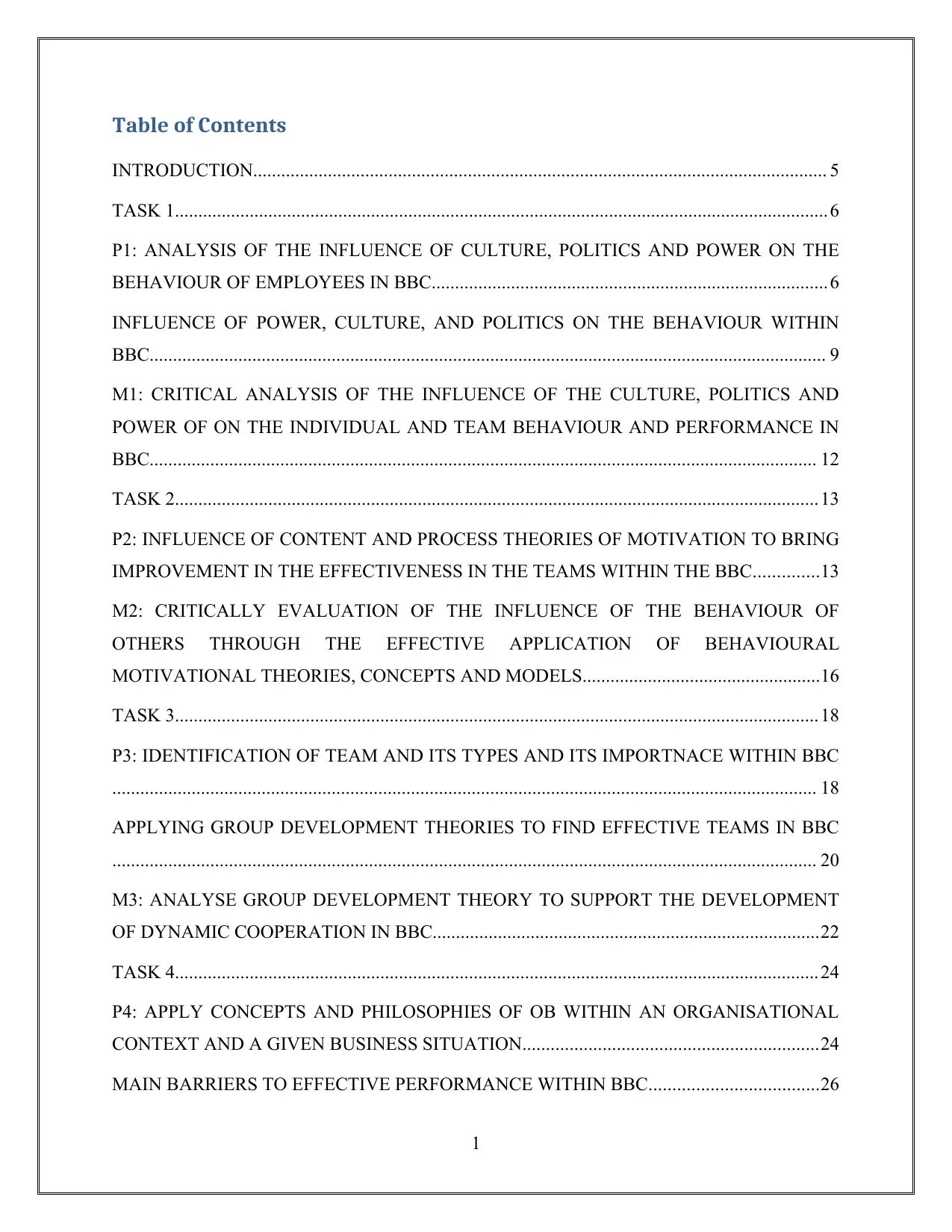
Table of Contents
INTRODUCTION........................................................................................................................... 5
TASK 1............................................................................................................................................ 6
P1: ANALYSIS OF THE INFLUENCE OF CULTURE, POLITICS AND POWER ON THE
BEHAVIOUR OF EMPLOYEES IN BBC..................................................................................... 6
INFLUENCE OF POWER, CULTURE, AND POLITICS ON THE BEHAVIOUR WITHIN
BBC................................................................................................................................................. 9
M1: CRITICAL ANALYSIS OF THE INFLUENCE OF THE CULTURE, POLITICS AND
POWER OF ON THE INDIVIDUAL AND TEAM BEHAVIOUR AND PERFORMANCE IN
BBC............................................................................................................................................... 12
TASK 2.......................................................................................................................................... 13
P2: INFLUENCE OF CONTENT AND PROCESS THEORIES OF MOTIVATION TO BRING
IMPROVEMENT IN THE EFFECTIVENESS IN THE TEAMS WITHIN THE BBC..............13
M2: CRITICALLY EVALUATION OF THE INFLUENCE OF THE BEHAVIOUR OF
OTHERS THROUGH THE EFFECTIVE APPLICATION OF BEHAVIOURAL
MOTIVATIONAL THEORIES, CONCEPTS AND MODELS...................................................16
TASK 3.......................................................................................................................................... 18
P3: IDENTIFICATION OF TEAM AND ITS TYPES AND ITS IMPORTNACE WITHIN BBC
....................................................................................................................................................... 18
APPLYING GROUP DEVELOPMENT THEORIES TO FIND EFFECTIVE TEAMS IN BBC
....................................................................................................................................................... 20
M3: ANALYSE GROUP DEVELOPMENT THEORY TO SUPPORT THE DEVELOPMENT
OF DYNAMIC COOPERATION IN BBC...................................................................................22
TASK 4.......................................................................................................................................... 24
P4: APPLY CONCEPTS AND PHILOSOPHIES OF OB WITHIN AN ORGANISATIONAL
CONTEXT AND A GIVEN BUSINESS SITUATION...............................................................24
MAIN BARRIERS TO EFFECTIVE PERFORMANCE WITHIN BBC....................................26
1
INTRODUCTION........................................................................................................................... 5
TASK 1............................................................................................................................................ 6
P1: ANALYSIS OF THE INFLUENCE OF CULTURE, POLITICS AND POWER ON THE
BEHAVIOUR OF EMPLOYEES IN BBC..................................................................................... 6
INFLUENCE OF POWER, CULTURE, AND POLITICS ON THE BEHAVIOUR WITHIN
BBC................................................................................................................................................. 9
M1: CRITICAL ANALYSIS OF THE INFLUENCE OF THE CULTURE, POLITICS AND
POWER OF ON THE INDIVIDUAL AND TEAM BEHAVIOUR AND PERFORMANCE IN
BBC............................................................................................................................................... 12
TASK 2.......................................................................................................................................... 13
P2: INFLUENCE OF CONTENT AND PROCESS THEORIES OF MOTIVATION TO BRING
IMPROVEMENT IN THE EFFECTIVENESS IN THE TEAMS WITHIN THE BBC..............13
M2: CRITICALLY EVALUATION OF THE INFLUENCE OF THE BEHAVIOUR OF
OTHERS THROUGH THE EFFECTIVE APPLICATION OF BEHAVIOURAL
MOTIVATIONAL THEORIES, CONCEPTS AND MODELS...................................................16
TASK 3.......................................................................................................................................... 18
P3: IDENTIFICATION OF TEAM AND ITS TYPES AND ITS IMPORTNACE WITHIN BBC
....................................................................................................................................................... 18
APPLYING GROUP DEVELOPMENT THEORIES TO FIND EFFECTIVE TEAMS IN BBC
....................................................................................................................................................... 20
M3: ANALYSE GROUP DEVELOPMENT THEORY TO SUPPORT THE DEVELOPMENT
OF DYNAMIC COOPERATION IN BBC...................................................................................22
TASK 4.......................................................................................................................................... 24
P4: APPLY CONCEPTS AND PHILOSOPHIES OF OB WITHIN AN ORGANISATIONAL
CONTEXT AND A GIVEN BUSINESS SITUATION...............................................................24
MAIN BARRIERS TO EFFECTIVE PERFORMANCE WITHIN BBC....................................26
1

M4: INFORMING AND INFLUENCING EMPLOYEES BEHAVIOUR IN POSITIVE AND
NEGATIVE WAYS THROUGH PATH-GOAL THEORY.........................................................27
CONCLUSION..............................................................................................................................28
REFERENCES.............................................................................................................................. 29
2
NEGATIVE WAYS THROUGH PATH-GOAL THEORY.........................................................27
CONCLUSION..............................................................................................................................28
REFERENCES.............................................................................................................................. 29
2
⊘ This is a preview!⊘
Do you want full access?
Subscribe today to unlock all pages.

Trusted by 1+ million students worldwide
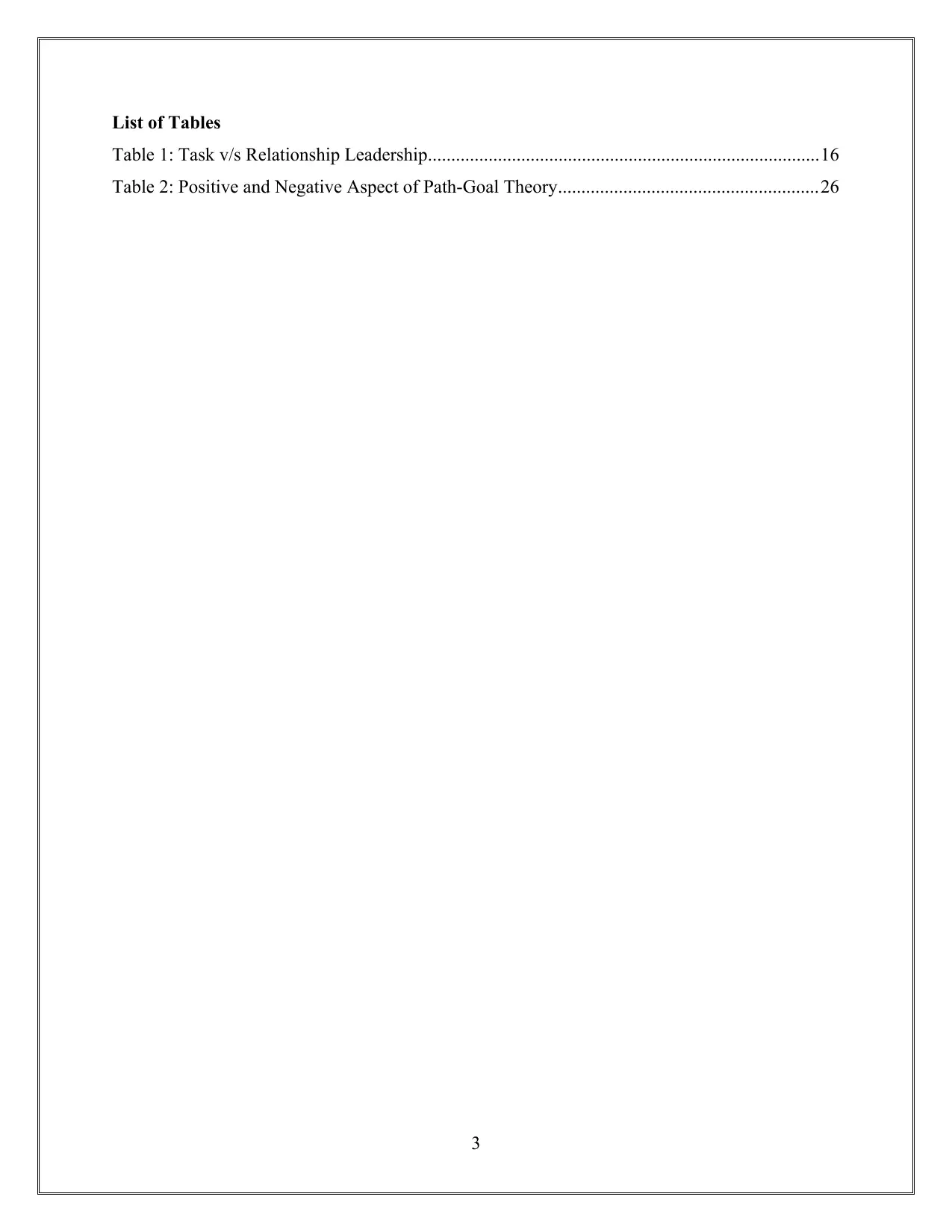
List of Tables
Table 1: Task v/s Relationship Leadership....................................................................................16
Table 2: Positive and Negative Aspect of Path-Goal Theory........................................................26
3
Table 1: Task v/s Relationship Leadership....................................................................................16
Table 2: Positive and Negative Aspect of Path-Goal Theory........................................................26
3
Paraphrase This Document
Need a fresh take? Get an instant paraphrase of this document with our AI Paraphraser
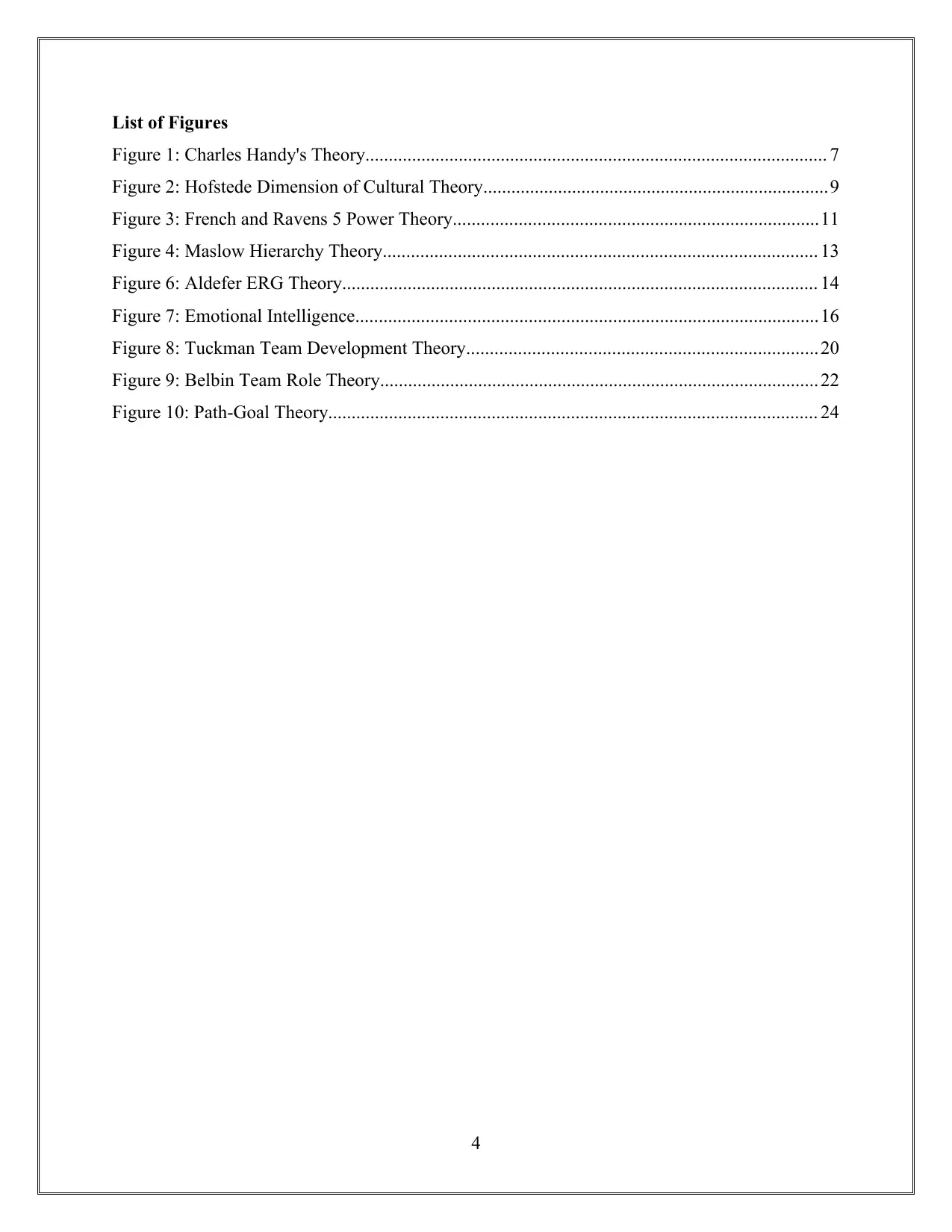
List of Figures
Figure 1: Charles Handy's Theory................................................................................................... 7
Figure 2: Hofstede Dimension of Cultural Theory..........................................................................9
Figure 3: French and Ravens 5 Power Theory..............................................................................11
Figure 4: Maslow Hierarchy Theory............................................................................................. 13
Figure 6: Aldefer ERG Theory...................................................................................................... 14
Figure 7: Emotional Intelligence...................................................................................................16
Figure 8: Tuckman Team Development Theory...........................................................................20
Figure 9: Belbin Team Role Theory.............................................................................................. 22
Figure 10: Path-Goal Theory......................................................................................................... 24
4
Figure 1: Charles Handy's Theory................................................................................................... 7
Figure 2: Hofstede Dimension of Cultural Theory..........................................................................9
Figure 3: French and Ravens 5 Power Theory..............................................................................11
Figure 4: Maslow Hierarchy Theory............................................................................................. 13
Figure 6: Aldefer ERG Theory...................................................................................................... 14
Figure 7: Emotional Intelligence...................................................................................................16
Figure 8: Tuckman Team Development Theory...........................................................................20
Figure 9: Belbin Team Role Theory.............................................................................................. 22
Figure 10: Path-Goal Theory......................................................................................................... 24
4
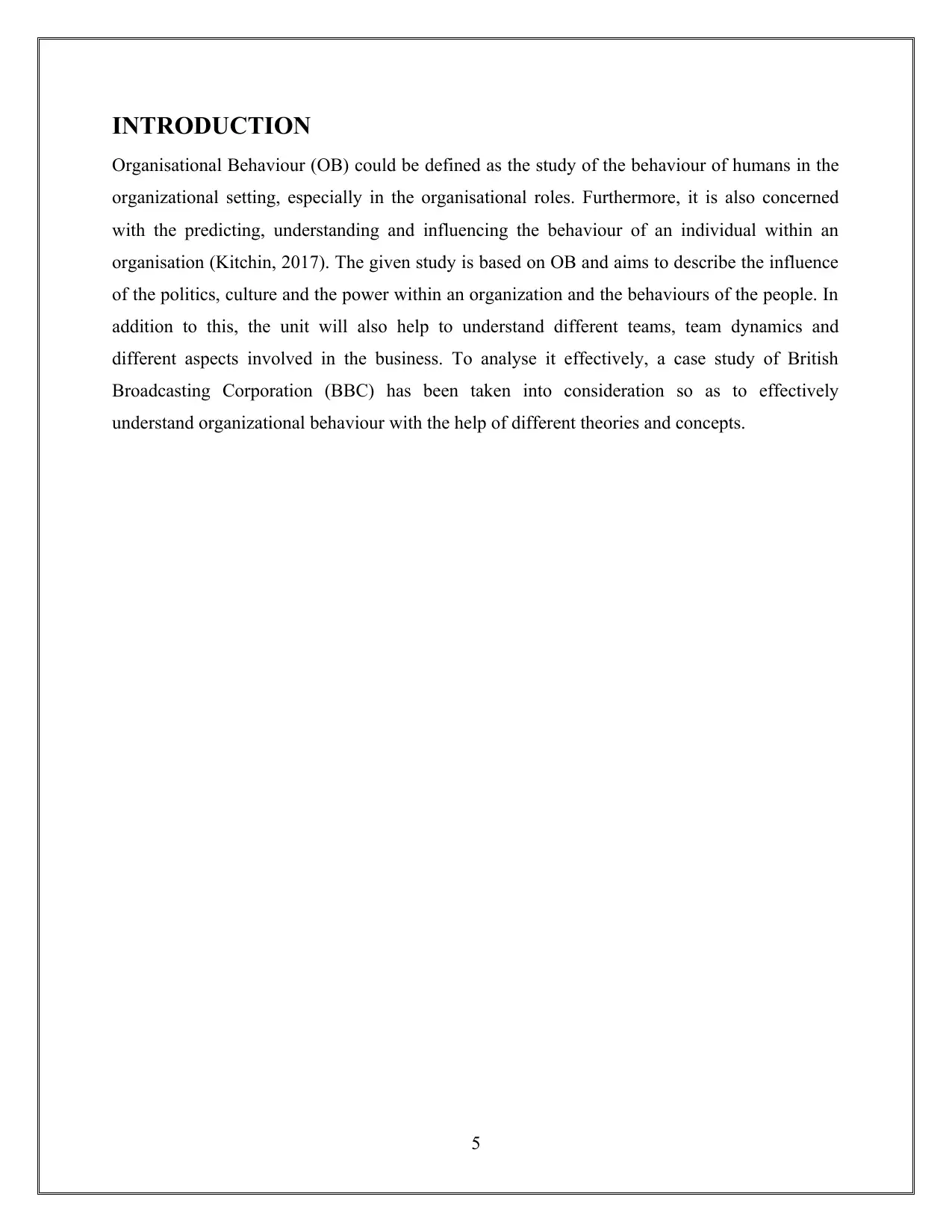
INTRODUCTION
Organisational Behaviour (OB) could be defined as the study of the behaviour of humans in the
organizational setting, especially in the organisational roles. Furthermore, it is also concerned
with the predicting, understanding and influencing the behaviour of an individual within an
organisation (Kitchin, 2017). The given study is based on OB and aims to describe the influence
of the politics, culture and the power within an organization and the behaviours of the people. In
addition to this, the unit will also help to understand different teams, team dynamics and
different aspects involved in the business. To analyse it effectively, a case study of British
Broadcasting Corporation (BBC) has been taken into consideration so as to effectively
understand organizational behaviour with the help of different theories and concepts.
5
Organisational Behaviour (OB) could be defined as the study of the behaviour of humans in the
organizational setting, especially in the organisational roles. Furthermore, it is also concerned
with the predicting, understanding and influencing the behaviour of an individual within an
organisation (Kitchin, 2017). The given study is based on OB and aims to describe the influence
of the politics, culture and the power within an organization and the behaviours of the people. In
addition to this, the unit will also help to understand different teams, team dynamics and
different aspects involved in the business. To analyse it effectively, a case study of British
Broadcasting Corporation (BBC) has been taken into consideration so as to effectively
understand organizational behaviour with the help of different theories and concepts.
5
⊘ This is a preview!⊘
Do you want full access?
Subscribe today to unlock all pages.

Trusted by 1+ million students worldwide
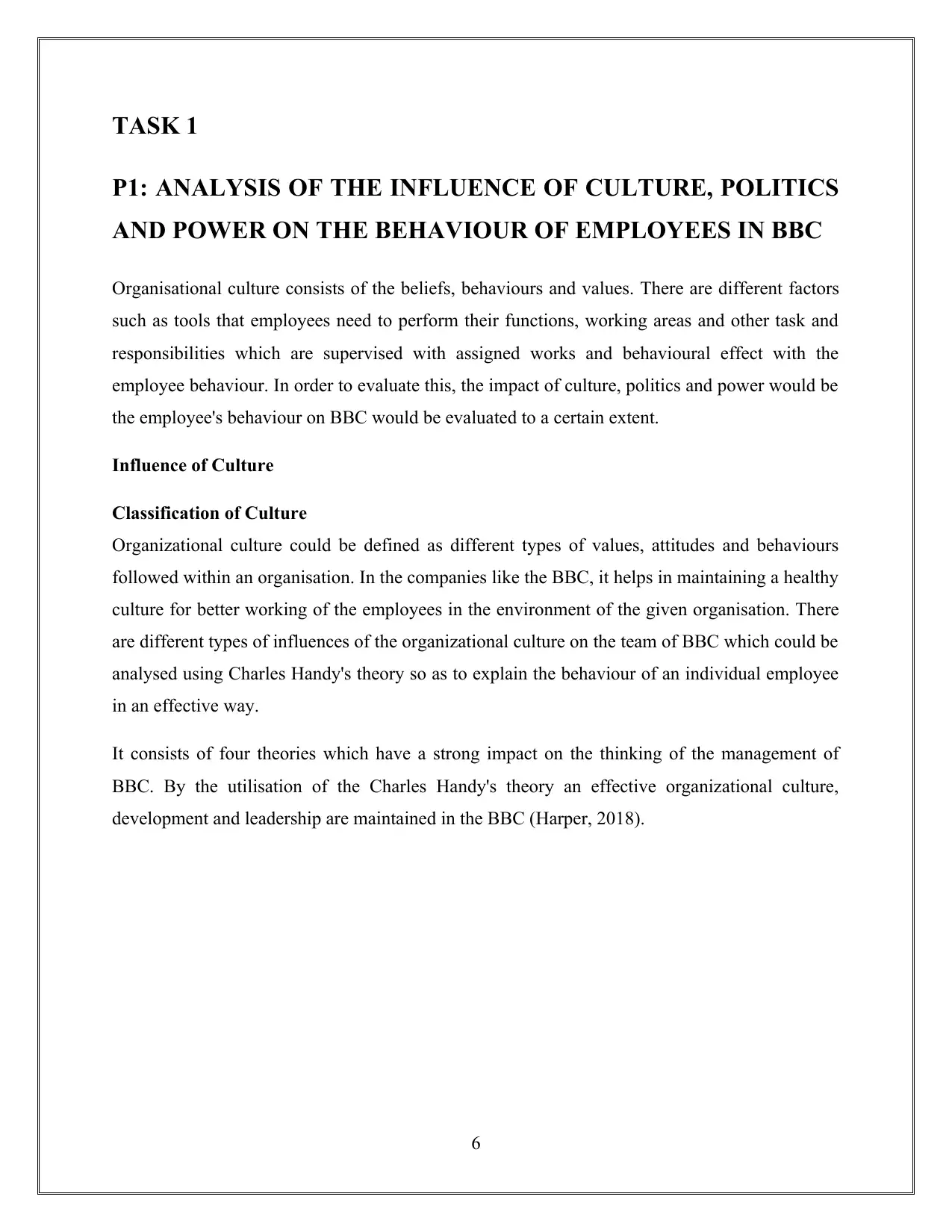
TASK 1
P1: ANALYSIS OF THE INFLUENCE OF CULTURE, POLITICS
AND POWER ON THE BEHAVIOUR OF EMPLOYEES IN BBC
Organisational culture consists of the beliefs, behaviours and values. There are different factors
such as tools that employees need to perform their functions, working areas and other task and
responsibilities which are supervised with assigned works and behavioural effect with the
employee behaviour. In order to evaluate this, the impact of culture, politics and power would be
the employee's behaviour on BBC would be evaluated to a certain extent.
Influence of Culture
Classification of Culture
Organizational culture could be defined as different types of values, attitudes and behaviours
followed within an organisation. In the companies like the BBC, it helps in maintaining a healthy
culture for better working of the employees in the environment of the given organisation. There
are different types of influences of the organizational culture on the team of BBC which could be
analysed using Charles Handy's theory so as to explain the behaviour of an individual employee
in an effective way.
It consists of four theories which have a strong impact on the thinking of the management of
BBC. By the utilisation of the Charles Handy's theory an effective organizational culture,
development and leadership are maintained in the BBC (Harper, 2018).
6
P1: ANALYSIS OF THE INFLUENCE OF CULTURE, POLITICS
AND POWER ON THE BEHAVIOUR OF EMPLOYEES IN BBC
Organisational culture consists of the beliefs, behaviours and values. There are different factors
such as tools that employees need to perform their functions, working areas and other task and
responsibilities which are supervised with assigned works and behavioural effect with the
employee behaviour. In order to evaluate this, the impact of culture, politics and power would be
the employee's behaviour on BBC would be evaluated to a certain extent.
Influence of Culture
Classification of Culture
Organizational culture could be defined as different types of values, attitudes and behaviours
followed within an organisation. In the companies like the BBC, it helps in maintaining a healthy
culture for better working of the employees in the environment of the given organisation. There
are different types of influences of the organizational culture on the team of BBC which could be
analysed using Charles Handy's theory so as to explain the behaviour of an individual employee
in an effective way.
It consists of four theories which have a strong impact on the thinking of the management of
BBC. By the utilisation of the Charles Handy's theory an effective organizational culture,
development and leadership are maintained in the BBC (Harper, 2018).
6
Paraphrase This Document
Need a fresh take? Get an instant paraphrase of this document with our AI Paraphraser
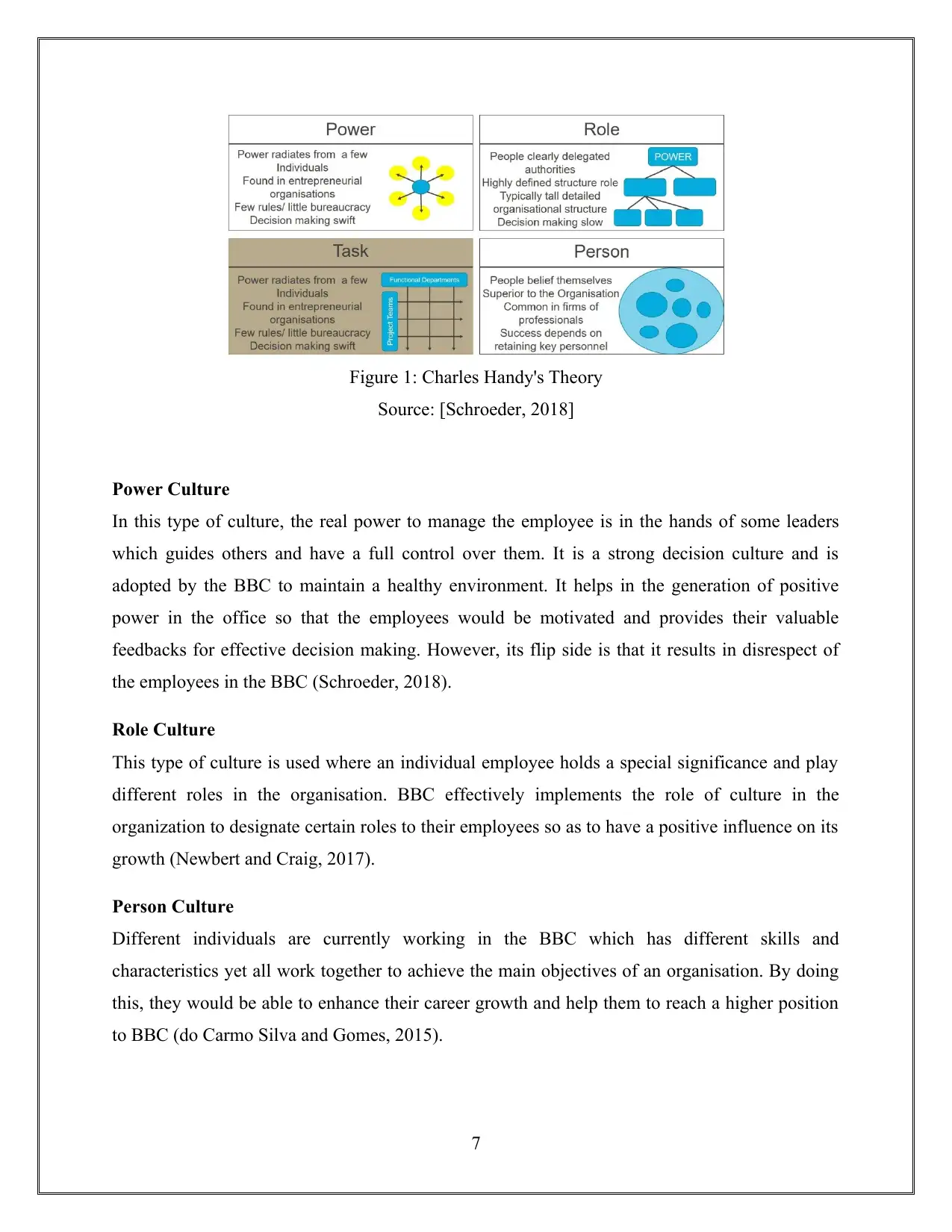
Figure 1: Charles Handy's Theory
Source: [Schroeder, 2018]
Power Culture
In this type of culture, the real power to manage the employee is in the hands of some leaders
which guides others and have a full control over them. It is a strong decision culture and is
adopted by the BBC to maintain a healthy environment. It helps in the generation of positive
power in the office so that the employees would be motivated and provides their valuable
feedbacks for effective decision making. However, its flip side is that it results in disrespect of
the employees in the BBC (Schroeder, 2018).
Role Culture
This type of culture is used where an individual employee holds a special significance and play
different roles in the organisation. BBC effectively implements the role of culture in the
organization to designate certain roles to their employees so as to have a positive influence on its
growth (Newbert and Craig, 2017).
Person Culture
Different individuals are currently working in the BBC which has different skills and
characteristics yet all work together to achieve the main objectives of an organisation. By doing
this, they would be able to enhance their career growth and help them to reach a higher position
to BBC (do Carmo Silva and Gomes, 2015).
7
Source: [Schroeder, 2018]
Power Culture
In this type of culture, the real power to manage the employee is in the hands of some leaders
which guides others and have a full control over them. It is a strong decision culture and is
adopted by the BBC to maintain a healthy environment. It helps in the generation of positive
power in the office so that the employees would be motivated and provides their valuable
feedbacks for effective decision making. However, its flip side is that it results in disrespect of
the employees in the BBC (Schroeder, 2018).
Role Culture
This type of culture is used where an individual employee holds a special significance and play
different roles in the organisation. BBC effectively implements the role of culture in the
organization to designate certain roles to their employees so as to have a positive influence on its
growth (Newbert and Craig, 2017).
Person Culture
Different individuals are currently working in the BBC which has different skills and
characteristics yet all work together to achieve the main objectives of an organisation. By doing
this, they would be able to enhance their career growth and help them to reach a higher position
to BBC (do Carmo Silva and Gomes, 2015).
7
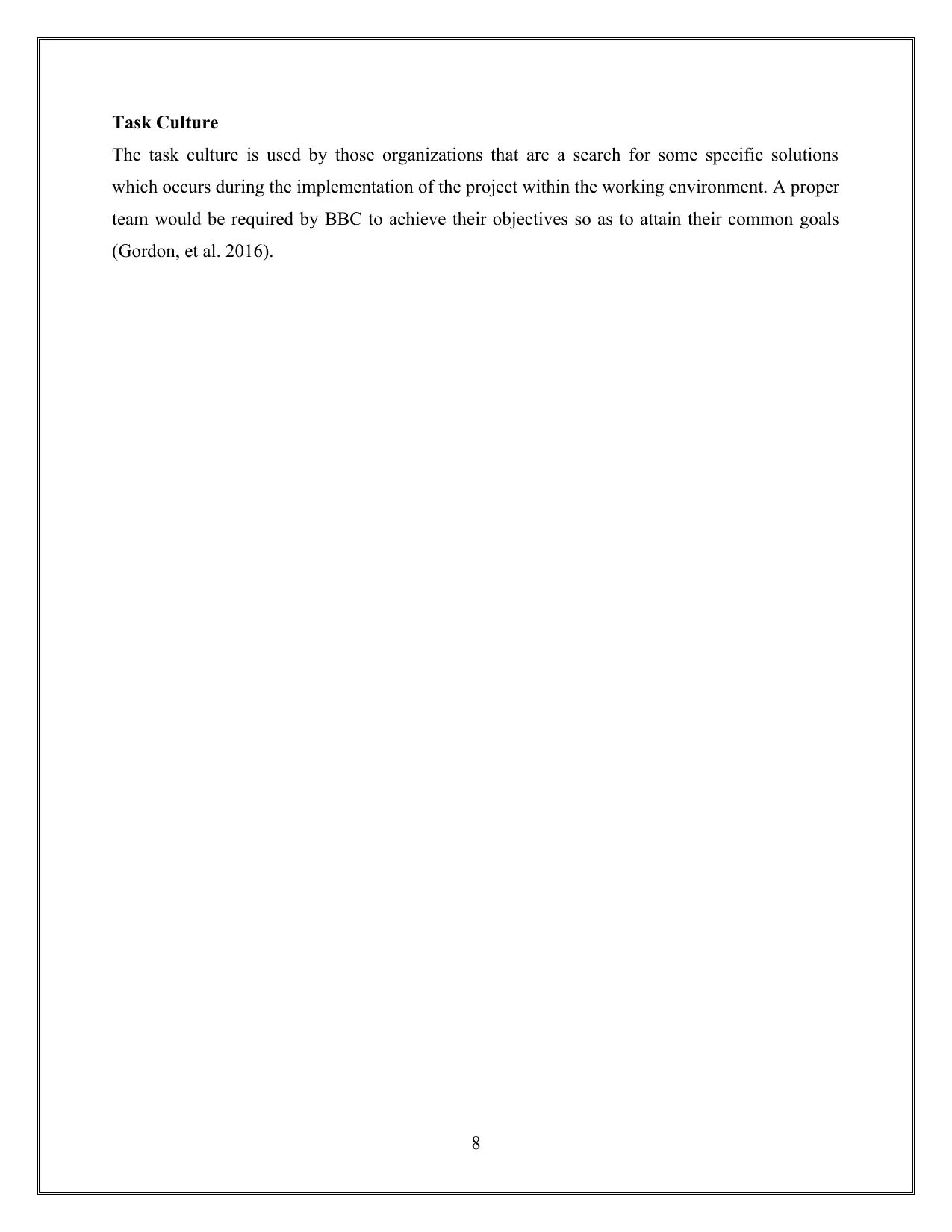
Task Culture
The task culture is used by those organizations that are a search for some specific solutions
which occurs during the implementation of the project within the working environment. A proper
team would be required by BBC to achieve their objectives so as to attain their common goals
(Gordon, et al. 2016).
8
The task culture is used by those organizations that are a search for some specific solutions
which occurs during the implementation of the project within the working environment. A proper
team would be required by BBC to achieve their objectives so as to attain their common goals
(Gordon, et al. 2016).
8
⊘ This is a preview!⊘
Do you want full access?
Subscribe today to unlock all pages.

Trusted by 1+ million students worldwide
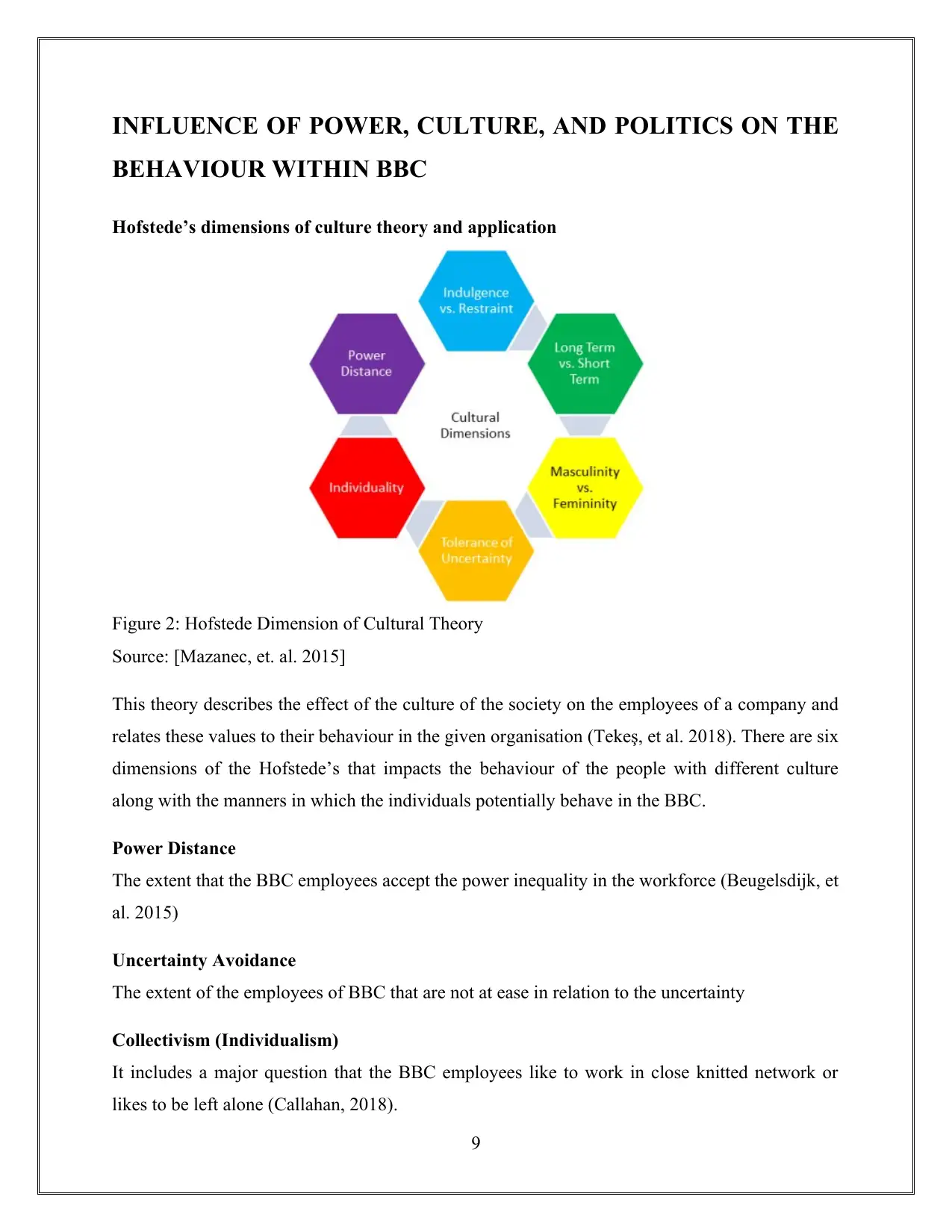
INFLUENCE OF POWER, CULTURE, AND POLITICS ON THE
BEHAVIOUR WITHIN BBC
Hofstede’s dimensions of culture theory and application
Figure 2: Hofstede Dimension of Cultural Theory
Source: [Mazanec, et. al. 2015]
This theory describes the effect of the culture of the society on the employees of a company and
relates these values to their behaviour in the given organisation (Tekeş, et al. 2018). There are six
dimensions of the Hofstede’s that impacts the behaviour of the people with different culture
along with the manners in which the individuals potentially behave in the BBC.
Power Distance
The extent that the BBC employees accept the power inequality in the workforce (Beugelsdijk, et
al. 2015)
Uncertainty Avoidance
The extent of the employees of BBC that are not at ease in relation to the uncertainty
Collectivism (Individualism)
It includes a major question that the BBC employees like to work in close knitted network or
likes to be left alone (Callahan, 2018).
9
BEHAVIOUR WITHIN BBC
Hofstede’s dimensions of culture theory and application
Figure 2: Hofstede Dimension of Cultural Theory
Source: [Mazanec, et. al. 2015]
This theory describes the effect of the culture of the society on the employees of a company and
relates these values to their behaviour in the given organisation (Tekeş, et al. 2018). There are six
dimensions of the Hofstede’s that impacts the behaviour of the people with different culture
along with the manners in which the individuals potentially behave in the BBC.
Power Distance
The extent that the BBC employees accept the power inequality in the workforce (Beugelsdijk, et
al. 2015)
Uncertainty Avoidance
The extent of the employees of BBC that are not at ease in relation to the uncertainty
Collectivism (Individualism)
It includes a major question that the BBC employees like to work in close knitted network or
likes to be left alone (Callahan, 2018).
9
Paraphrase This Document
Need a fresh take? Get an instant paraphrase of this document with our AI Paraphraser
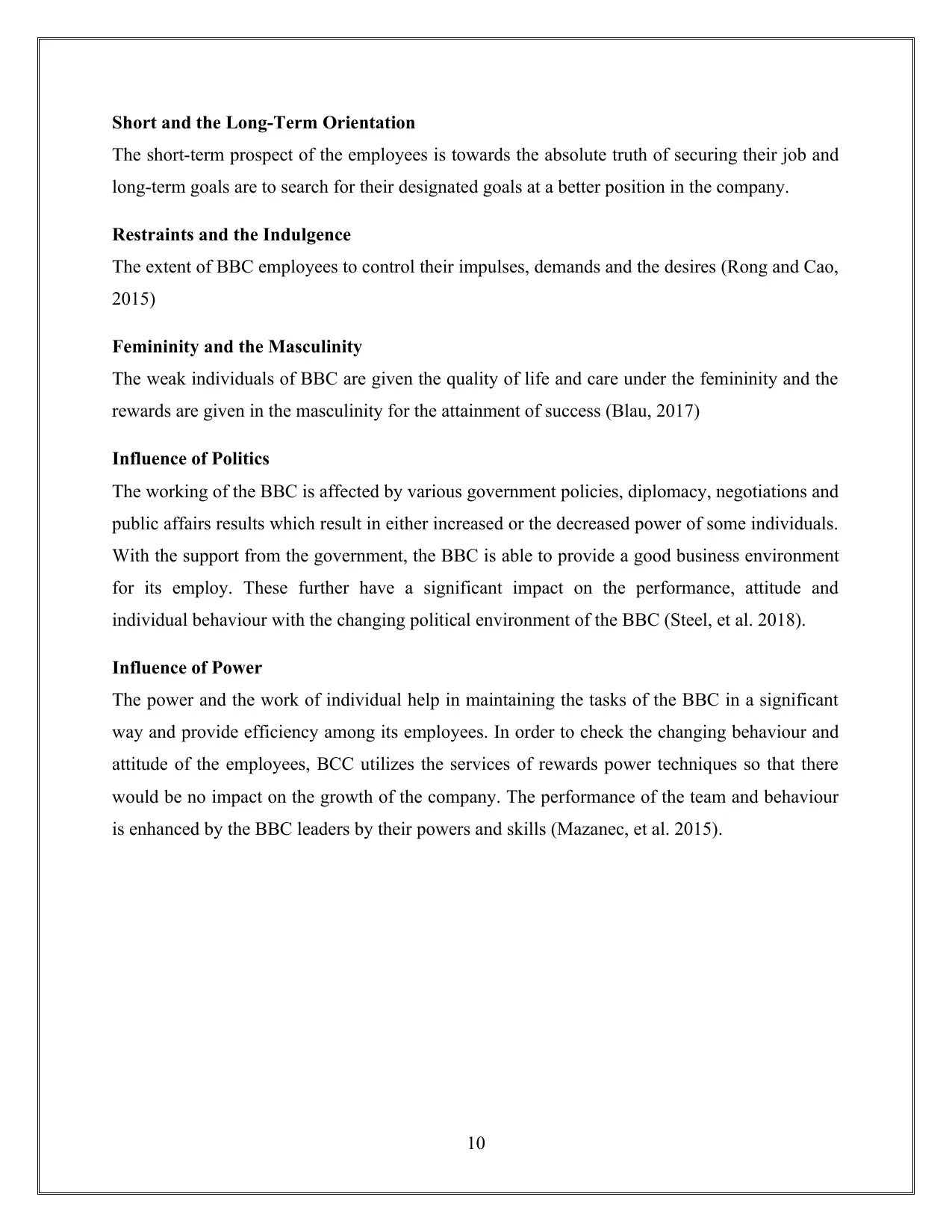
Short and the Long-Term Orientation
The short-term prospect of the employees is towards the absolute truth of securing their job and
long-term goals are to search for their designated goals at a better position in the company.
Restraints and the Indulgence
The extent of BBC employees to control their impulses, demands and the desires (Rong and Cao,
2015)
Femininity and the Masculinity
The weak individuals of BBC are given the quality of life and care under the femininity and the
rewards are given in the masculinity for the attainment of success (Blau, 2017)
Influence of Politics
The working of the BBC is affected by various government policies, diplomacy, negotiations and
public affairs results which result in either increased or the decreased power of some individuals.
With the support from the government, the BBC is able to provide a good business environment
for its employ. These further have a significant impact on the performance, attitude and
individual behaviour with the changing political environment of the BBC (Steel, et al. 2018).
Influence of Power
The power and the work of individual help in maintaining the tasks of the BBC in a significant
way and provide efficiency among its employees. In order to check the changing behaviour and
attitude of the employees, BCC utilizes the services of rewards power techniques so that there
would be no impact on the growth of the company. The performance of the team and behaviour
is enhanced by the BBC leaders by their powers and skills (Mazanec, et al. 2015).
10
The short-term prospect of the employees is towards the absolute truth of securing their job and
long-term goals are to search for their designated goals at a better position in the company.
Restraints and the Indulgence
The extent of BBC employees to control their impulses, demands and the desires (Rong and Cao,
2015)
Femininity and the Masculinity
The weak individuals of BBC are given the quality of life and care under the femininity and the
rewards are given in the masculinity for the attainment of success (Blau, 2017)
Influence of Politics
The working of the BBC is affected by various government policies, diplomacy, negotiations and
public affairs results which result in either increased or the decreased power of some individuals.
With the support from the government, the BBC is able to provide a good business environment
for its employ. These further have a significant impact on the performance, attitude and
individual behaviour with the changing political environment of the BBC (Steel, et al. 2018).
Influence of Power
The power and the work of individual help in maintaining the tasks of the BBC in a significant
way and provide efficiency among its employees. In order to check the changing behaviour and
attitude of the employees, BCC utilizes the services of rewards power techniques so that there
would be no impact on the growth of the company. The performance of the team and behaviour
is enhanced by the BBC leaders by their powers and skills (Mazanec, et al. 2015).
10
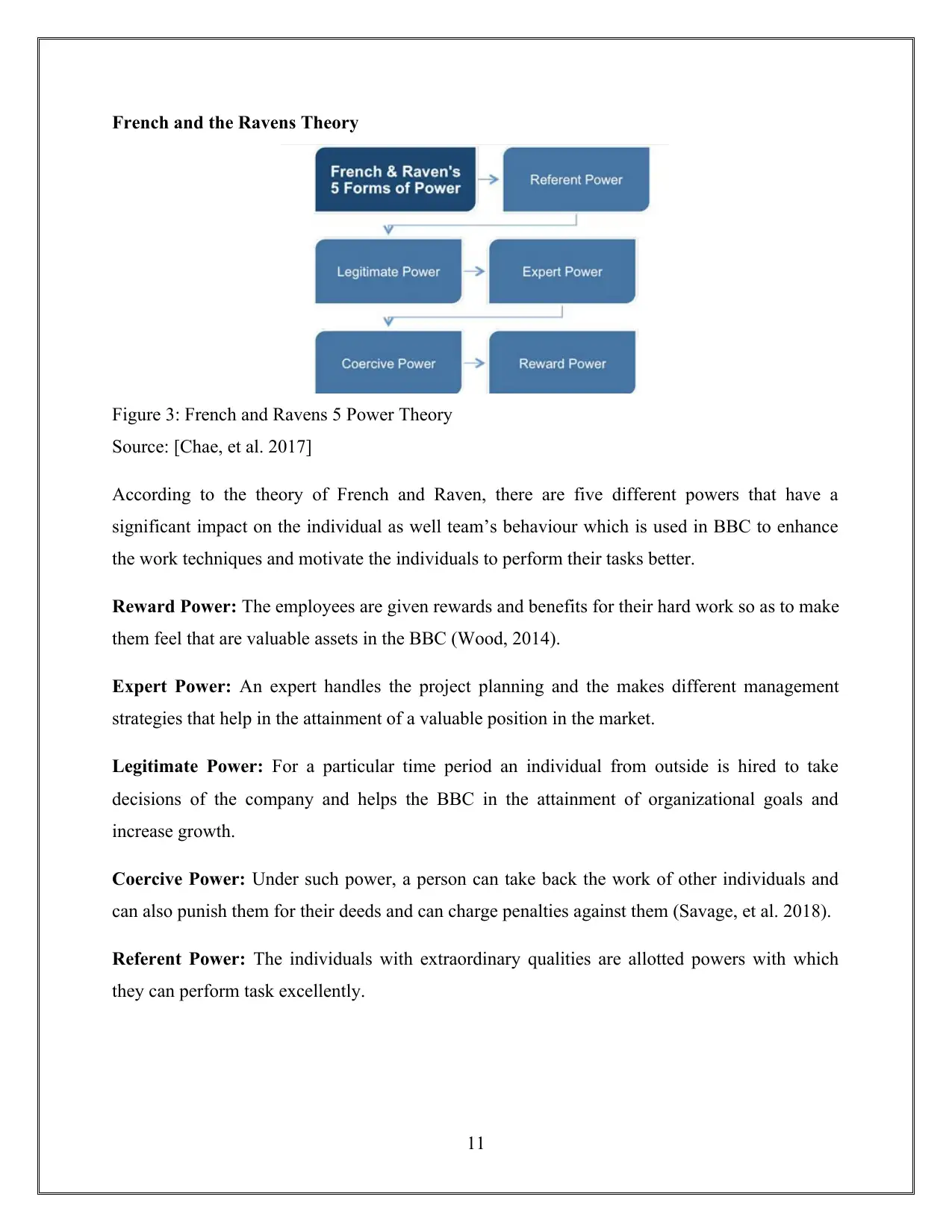
French and the Ravens Theory
Figure 3: French and Ravens 5 Power Theory
Source: [Chae, et al. 2017]
According to the theory of French and Raven, there are five different powers that have a
significant impact on the individual as well team’s behaviour which is used in BBC to enhance
the work techniques and motivate the individuals to perform their tasks better.
Reward Power: The employees are given rewards and benefits for their hard work so as to make
them feel that are valuable assets in the BBC (Wood, 2014).
Expert Power: An expert handles the project planning and the makes different management
strategies that help in the attainment of a valuable position in the market.
Legitimate Power: For a particular time period an individual from outside is hired to take
decisions of the company and helps the BBC in the attainment of organizational goals and
increase growth.
Coercive Power: Under such power, a person can take back the work of other individuals and
can also punish them for their deeds and can charge penalties against them (Savage, et al. 2018).
Referent Power: The individuals with extraordinary qualities are allotted powers with which
they can perform task excellently.
11
Figure 3: French and Ravens 5 Power Theory
Source: [Chae, et al. 2017]
According to the theory of French and Raven, there are five different powers that have a
significant impact on the individual as well team’s behaviour which is used in BBC to enhance
the work techniques and motivate the individuals to perform their tasks better.
Reward Power: The employees are given rewards and benefits for their hard work so as to make
them feel that are valuable assets in the BBC (Wood, 2014).
Expert Power: An expert handles the project planning and the makes different management
strategies that help in the attainment of a valuable position in the market.
Legitimate Power: For a particular time period an individual from outside is hired to take
decisions of the company and helps the BBC in the attainment of organizational goals and
increase growth.
Coercive Power: Under such power, a person can take back the work of other individuals and
can also punish them for their deeds and can charge penalties against them (Savage, et al. 2018).
Referent Power: The individuals with extraordinary qualities are allotted powers with which
they can perform task excellently.
11
⊘ This is a preview!⊘
Do you want full access?
Subscribe today to unlock all pages.

Trusted by 1+ million students worldwide
1 out of 33
Related Documents
Your All-in-One AI-Powered Toolkit for Academic Success.
+13062052269
info@desklib.com
Available 24*7 on WhatsApp / Email
![[object Object]](/_next/static/media/star-bottom.7253800d.svg)
Unlock your academic potential
Copyright © 2020–2026 A2Z Services. All Rights Reserved. Developed and managed by ZUCOL.




